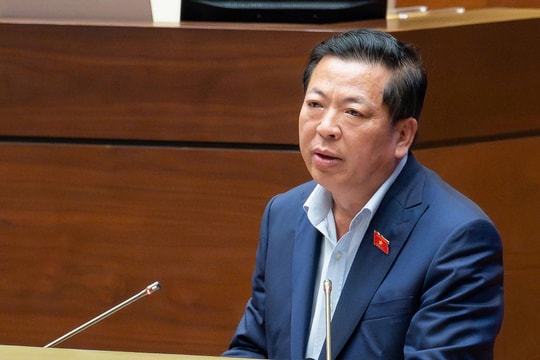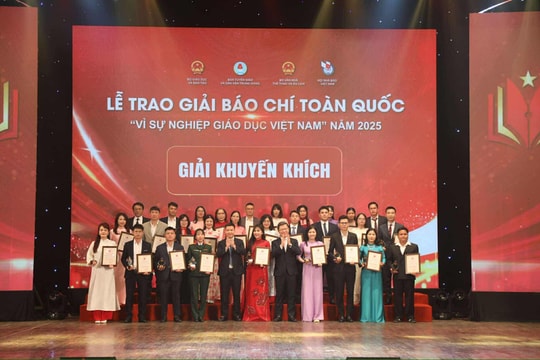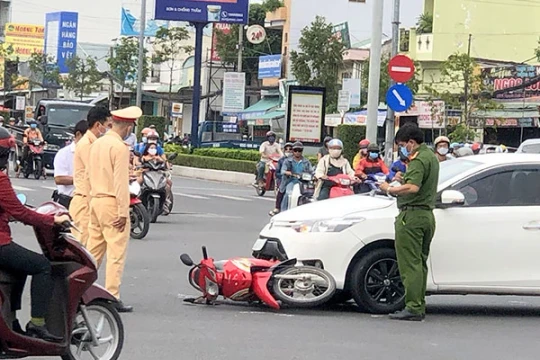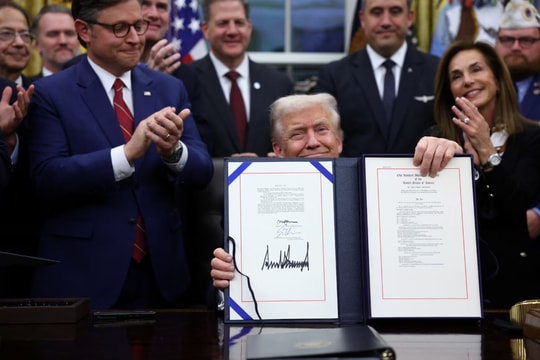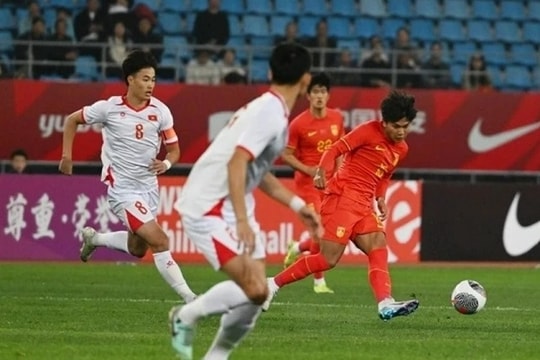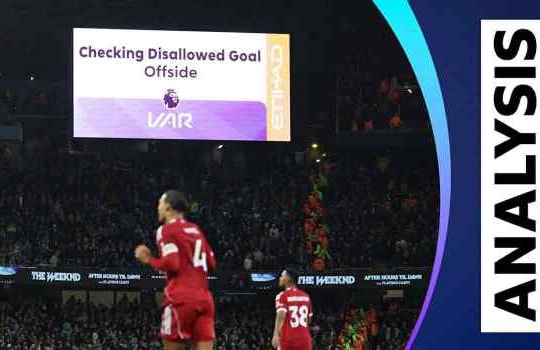Deputy Minister of Information and Communications talks about the Press Law (amended)
Deputy Minister of Information and Communications Truong Minh Tuan had an interview with the press about the Press Law (amended) considered and approved at the 11th session of the 13th National Assembly.
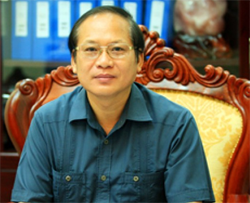 |
| Deputy Minister of Information and Communications Truong Minh Tuan. Photo: Ministry of Information and Communications Portal Many new regulations are included in the law |
Many new regulations were introduced into the law.
Can you give a general comment on the new points of the revised Press Law?
Mr. Truong Minh Tuan: It can be said that the first new point is that the Press Law (amended and supplemented) implements the important content stipulated in Article 14 and Article 25 of the 2013 Constitution, which stipulates the right to freedom of the press and freedom of speech in the press. This is the most discussed content because freedom of the press and freedom of speech are actually an aspect of democracy in our country, but they are limited rights according to the laws of all countries in the world. Such limitation is based on the "harm principle", "offense principle" or conflicts with other rights.
Second, the Press Law devotes a very satisfactory section to systematically covering prohibited content and acts in press activities. This provision aims to firmly limit press abuses such as “violation of privacy” in the practice of press development in our country.
Third, the Press Law creates a broad and strict legal framework, while at the same time strongly protecting with necessary and sufficient institutions for press agencies and journalists to operate freely within the framework of regulations from providing information to the press, to the rights and obligations of press agencies and journalists to keep information sources confidential.
Fourth is to ensure and expand the multi-dimensional and deep connection in press activities. The highlight that needs to be emphasized is that this connection ensures that readers have the right to benefit from the content and press agencies have the right to benefit economically in reality, while previously this connection was only reflected in legal documents.
To implement the 2013 Constitution, how does the Press Law (amended) regulate the issues of freedom of speech and freedom of the press?
Mr. Truong Minh Tuan: Implementing the 2013 Constitution, the draft Press Law has shown this content in the following aspects:
Firstly, the draft Law has devoted Chapter II with 4 articles specifically regulating citizens' freedom of the press and freedom of speech in the press. It stipulates that citizens have the right to: Create journalistic works, provide information to the press, respond to information in the press, access press information, cooperate with press agencies to produce journalistic products, print and distribute printed newspapers; contribute opinions, criticisms, recommendations, complaints and denunciations in the press against Party organizations, State agencies and political, social and professional organizations and members of those agencies and organizations.
Press agencies are responsible for publishing and broadcasting citizens' petitions, criticisms, news, articles, photos and other press works that are consistent with their principles and purposes and do not violate the prohibited content specified in Article 9; in case of non-publishing or broadcasting, they must respond and state the reasons upon request.
Second, regarding the subjects of establishing press agencies. The draft Law on Press (amended) retains the subjects of establishing press agencies according to current law and has added a number of subjects that are allowed to establish scientific journals such as: Higher education institutions according to the provisions of the Law on Higher Education; scientific research organizations, scientific research and technology development organizations organized in the form of academies and institutes according to the provisions of the Law on Science and Technology; hospitals from the provincial level, centrally-run cities or equivalent or higher. This regulation allows private educational institutions, scientific and technological organizations with foreign investment to publish scientific journals.
Third, the draft law has added provisions on association in press activities. With the provisions in Chapter II and the content expressed in the draft Law, citizens are allowed to participate in all stages of press activities, ensuring citizens' right to freedom of the press and freedom of speech in the press.
What provisions does the Press Law (amended) have to handle and limit violations of information content in the press?
Mr. Truong Minh Tuan: The provisions on prohibited acts in press activities in Article 9 of the draft Law have been considered, inheriting the relevant provisions of the current Press Law, and have asked for opinions from press agencies and experts many times during the process of drafting the law and received consensus.
On the other hand, the acts of prohibiting posting and broadcasting information as prescribed in Clause 1 and Clause 2, Article 9 are compatible with the provisions of the 2015 Penal Code, and other prohibited acts are compatible with the Civil Code and other laws, ensuring feasibility in practice.
Regarding corrections in the press, compared to the current Press Law, the draft law has added a number of new provisions on corrections to ensure the legitimate rights and interests of agencies, organizations and individuals whose information is falsely reported by the press, such as: For electronic press, in addition to posting and broadcasting corrections and apologies, the false information that has been posted and broadcast must also be immediately removed. Corrections and apologies by press agencies and authors must be posted and broadcast on page 2 (for printed newspapers), the last page (for printed magazines), a separate column on the home page (for electronic newspapers) with the same font and font size as the press has posted and broadcast information; posted and broadcast in the correct column, broadcast time, and number of broadcasts (for radio and television newspapers) that the press has posted and broadcast information...
Regarding handling violations, the draft Law on Press (amended) has added a number of new regulations such as: Press agencies will have their press operation licenses, licenses to publish additional press publications, supplements, produce additional radio channels, television channels, specialized pages of electronic newspapers revoked, and agencies and organizations will have their licenses to publish special issues, newsletters, and general electronic information pages revoked when posting or broadcasting information that violates the provisions of Clauses 1, 2, 3, 4, 5, 6, 7, 8, 9, Article 9, causing very serious or especially serious consequences. Organizations and individuals who infringe intellectual property rights in the field of press will be handled according to the provisions of the law on intellectual property.
Tighten management of information on the Internet
Some people say that the prohibitions in the Press Law are still vague. What is your opinion on this issue?
Mr. Truong Minh Tuan: In terms of law, to handle and limit violations of information content in the press, the draft Law on Press (amended) has specifically stipulated the legal corridor for the press and journalists to operate, prohibited acts in press activities and regulations on handling violations in press activities. With the provisions as in the draft Law, press agencies that properly implement their principles, purposes and comply with legal regulations will limit violations of information content in the press.
We affirm that information on the internet is not journalism but its activities have the nature of journalism, if positive then very positive but bad then very bad. So what measures are needed to manage this problem?
Mr. Truong Minh Tuan: The draft Law on Press (amended) regulates and manages information on press products and information products of a journalistic nature. According to the explanation of terms in Clause 17, Article 3, information products of a journalistic nature are information products expressed in press genres, published and broadcast on newsletters, special issues, and general electronic information pages of agencies, organizations, and enterprises.
Currently, the activities of social networks are regulated by Decree No. 72/2013/ND-CP dated July 15, 2013 of the Government and sanctions for administrative violations according to the provisions of Decree No. 174/2013/ND-CP dated November 13, 2013 of the Government. Implementing the 2013 Constitution, in the coming time, the Ministry of Information and Communications will organize an assessment and summary of the implementation of Decree 72/2013/ND-CP, on that basis, submit to the Government and the National Assembly to include in the program of building other basic laws to manage the activities of information on the network in general and social networks in particular.
Can you tell us your opinion on the planning of general electronic information sites today?
Mr. Truong Minh Tuan: In essence, a general electronic information page is to re-post verbatim, accurately the source of press information and clearly state the name of the author, the name of the press agency, the time of posting and broadcasting that information. Based on the assessment of the implementation of Decree No. 72/2013/ND-CP, the Ministry of Information and Communications will consider whether to plan the current electronic information pages or not. The Project on Planning for the development and management of the national press until 2025 has been reviewed and commented on by the Politburo 3 times, and the Central Executive Committee of the Party has discussed and commented on it once, so these are also the leadership and direction views on press work.
Do the provisions of this Press Law conflict with the orientation of the national press development and management planning until 2025, sir?
Mr. Truong Minh Tuan:The orientation contents in the press planning do not contradict with the draft Press Law (amended) but are closely linked together. The amended Press Law, which will be issued in the coming time, will be the legal basis for implementing the contents approved by the Politburo and the Central Executive Committee, as stated in the planning project.
Creating conditions for press development
Nowadays, the press faces many difficulties: Radio and television newspapers are competing with online newspapers, and online newspapers are competing with social networks. So does the revised Press Law have any provisions to create conditions for the development of the mainstream press, sir?
Mr. Truong Minh Tuan: I think that the revised Press Law this time is timely, creating a fair environment for all types of press to operate and develop. The revised Law is a solid legal foundation for the development of modern press, specifically regulating the legal corridor for all types of press and journalists to operate.
The draft Law on Press (amended) also stipulates that the State has a policy: Ordering press to serve political, security, national defense, foreign information tasks, serving teenagers, children, the deaf, the blind, ethnic minorities, areas with especially difficult socio-economic conditions, remote areas, mountainous areas, border areas, islands and other important tasks suitable for each stage according to the Prime Minister's decision; supporting press transportation costs to serve the above tasks, subjects and areas.
In addition, the draft new Press Law has more open provisions than the current Press Law on business and service activities of press agencies, as shown in Point c, Clause 2, Article 21, which stipulates that the revenue of press agencies includes revenue from business and service activities of press agencies and units under press agencies.
How is the issue of linking press agencies with media businesses managed?
Mr. Truong Minh Tuan: Press agencies proactively implement and take responsibility without having to ask for permission from the state press management agency, in order to reform administrative procedures, ensuring the autonomy and self-responsibility of press agencies. In particular, the Law specifically stipulates the fields and contents in which press agencies are allowed to cooperate with other press agencies, legal entities, and individuals with business registration appropriate to the joint fields; the maximum duration of cooperation in radio and television channels serving political tasks, essential information and propaganda according to regulations and news - political - general channels; the maximum duration of cooperation in the production of entire radio and television channels by radio and television agencies.
Journalists’ access to information from state agencies still faces many difficulties, although the Government has issued regulations on speaking and providing information to the press. In your opinion, how should this issue be regulated to create conditions for the press to provide information as quickly and accurately as possible?
Mr. Truong Minh Tuan:In addition to the provisions of the current Press Law, the draft Law has specifically stipulated the responsibility of agencies, organizations and responsible individuals to provide information to the press; information that competent agencies, organizations and individuals have the right to refuse to provide to the press.
To protect press sources and journalists' rights to work, compared to the current Press Law, the draft Law stipulates that press agencies and journalists must only disclose information providers when there is a written request from the Chief Prosecutor of the People's Procuracy, Chief Justice of the People's Court at the provincial level or equivalent or higher, necessary for the investigation and trial of very serious and especially serious crimes...
According to the Portal of the Ministry of Information and Communications\


